Blues Reviews
Oct/Nov 2019
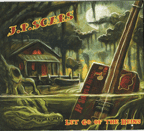 J.P.
Soars
J.P.
Soars
Let Go of the Reins
Whiskey Bayou Records 2019
Guitarist, singer, and songwriter J.P. Soars soars…yes he does.
Since his victories in 2009 at the International Blues Challenge - in
the band competition with his group the Red Hots, and with the Albert
King Award as best guitarist - he has been on a steady upward trajectory,
both with his own band and in the amalgam Southern Comfort with musical
colleagues Victor Wainwright and Damon Fowler.
His sixth album represents a collaboration with another notable contemporary,
Tab Benoit, on Tab’s recently formed record label, Whiskey Bayou.
Soars and Benoit have been frequent jam buddies whenever their paths crossed.
Benoit produced the set, and - to the surprise of nobody who has seen
him grab the drumsticks at various events - he also occupies the drum
chair. Along for the ride is Soars’ regular drummer, Chris Peet,
who cedes the sticks to Benoit and wields bass instead. Six of the eleven
tracks are augmented by the contributions of Tillis Verdin on organ.
A 2019 Blues Foundation nominee for a Blues Music Award for Blues Rock
Artist of the Year, Soars delays his rock credentials briefly with the
opening track, “Been Down So Long,” a syncopated shuffle with
characteristically tasty guitar licks. Rock proclivity emerges vigorously
on “If You Wanna Get to Heaven,” goosed to near frenzy by
Benoit’s skilled drumming, and we are off to the races. “Freddie
King Thing” reverts to the initial format, without loss of momentum,
buttressed by Verdin’s swirling organ backing. It seems that a pattern
is set…a welcome one.
However, the pattern is disrupted by “Lonely Fire,“ a slow
track featuring Soars’ raspy, Southern-inflected vocal drawl and
his most lyrical and sublime guitar leads of the set. After another rocker,
we’re treated to “Let It Ride,” the set’s shortest
tune, an unmistakably country-inflected song with twangy guitar and a
vocal that evokes comparison with the singing of the late Levon Helm of
The Band. Soon after, the instrumental “Minor Blues,” a composition
of the great guitarist Django Reinhardt, allows Soars to demonstrate that
he can handle jazz adeptly. The set closes pleasingly with “Old
Silver Bridge,” again sporting a country music vibe, with Soars
sounding good on Dobro and meshing smoothly with Peet and Benoit.
A few minor caveats: Soars penned seven of the songs, but the lyrics are
somewhat repetitive; on one song, the same phrase is repeated well over
a dozen times. Peet’s bass playing is right on, but often low in
the mix. In contrast, Benoit’s drumming, terrific throughout, is
overly prominent on many cuts. These few debits do little to detract from
another enjoyable and quality release by Soars.—Steve Daniels
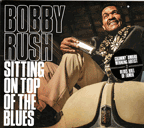 Bobby
Rush
Bobby
Rush
Sitting on Top of the Blues
Deep Rush Records 2019
I’m OK with the title of Bobby Rush’s latest release, but
here are two alternatives that also would have been appropriate: “Lust
and Laughter” and “Let’s Launch Some Raunch.”
Eighty-five years young, Rush has nothing more to prove. A musician since
his youth, he has been an inimitable fixture on the blues scene for well
over five decades. He has issued about fifty albums and still tours regularly.
A holder of multiple Blues Music Awards and a myriad more nominations,
he won a Grammy for his previous release, 2016’s “Porcupine
Meat.” That album featured guests Keb’ Mo’, Dave Alvin,
and Joe Bonamassa, and the principal guitar work was by fellow Mississippian
Vasti Jackson. On “Sitting” Jackson continues to deliver his
fine guitar work, while he and Rush share producing credit with guitarist
Patrick Hayes. A terrific slew of session musicians comprise the accompanying
ensemble through the set of eleven original tunes.
Those who have enjoyed Rush and his live musical revue in one of its spectrum
of settings - the chitlin’ circuit, blues cruises, auditoriums -
aren’t disappointed to find a similar vibe on his records. I liken
Rush to the late African American comedian Redd Foxx, whose comedy - at
least in mainstream venues - consisted of very thinly veiled sexual double
entendres (but not as explicit as the comedy of today’s comedians,
who are less constrained in subject and language). Like Foxx, Rush deals
repeatedly and with minimally masked innuendo in the joys and perils of
sex, delivered with good humor and premium musicianship.
The set commences with “Hey Hey Bobby Rush,” an upbeat introduction
with Jackson providing both lead guitar and thrumming bass and with a
horn trio wailing as Bobby declares that “I’m a bluesman.”
(No argument here.) For those unaware that Rush is a skilled harmonica
player, he provides evidence that he is. “Good Stuff” follows,
exploiting the frequent album theme: “You got that something, ha,
make a chicken squawk.” “You Got the Goods,” “Sweet
Lizzy,” and “Recipe for Love” embellish the theme, the
latter track a duo of Rush and Jackson. Stuck in between is “Get
Out of Here (Dog Named Bo),” a ribald tale of thwarted love told
as only Rush can spin a musical yarn. Cue the chuckles.
…which recur on “Pooky Poo”; Rush is a lyricist unashamed
to flaunt childish endearments: “Want me to jump, tell me how high/Anything
you want me to do, if you be my pooky poo.” The ensuing “Slow
Motion” is a lascivious seduction song, and the penultimate track,
“Shake Til’ You Get Enough,” is a funky appeal to shake,
wiggle, and twerk, bolstered by a quartet of backing singers. The set
ends with “Bowlegged Woman,” whose lyrics are not subtle at
all: “Girl over there, with your hot pants on/Turn her loose, let
her turn me on…Bowlegged woman and knockneed [sic] man/…go
together like two peas in a pod.”
Bobby Rush can still bring it effectively and vivaciously. His vocals
sound good, his harmonica playing is sharp, the ensemble is crisp, the
songs are witty. Let’s hope that Rush continues sitting on top of
the blues for years to come.—Steve Daniels
 Mike
Wheeler Band
Mike
Wheeler Band
Turn Up!!
www.mikewheelerband.com
The Mike Wheeler Band is a Chicago all-star band of sorts. The members
all have experience with a who’s who of notable blues names. Miraculously
the line-up hasn’t changed since its inception in 2001. The band
includes bassist Larry Williams, keyboardist Brian James (once the musical
director for the legendary Lonnie Brooks) and drummer Cleo Cole. Singer/guitarist
Mike Wheeler toured with Big James &the Chicago Playboys for years
and recorded five albums with that group. He was inducted into the Chicago
Blues Hall of Fame in 2014.
Turn Up!! is the Mike Wheeler Band’s (also known as MWB) second
release for the esteemed Delmark record label. Along with the 4-piece
band, a horn section including Kenny Anderson on trumpet and Hank Ford
on saxophone adds punch to most of the tracks on the record. The gritty
blues progression “Sweet Girl” starts things off with a bang.
A hot B3 organ solo by Brian James leads into Wheeler’s tasty solo.
“Yeah” is a funky jam that goes into a “horn-hitting
bass-popping” James Brownish breakdown leading into an epic wah
wah solo. The title track is a rocking number with the horns adding accents
behind Wheeler’s vocals and guitar chops. “Brand New Cadillac”
rocks out hard with a monster Cream-styled riff. Wheeler is just as comfortable
laying down clean blues licks as he is mucking about with a nasty distortion
tone. Both approaches work admirably. “Nothing Lasts Forever”
is a breezy tune with some soulful vocals from Wheeler and smooth backup
vocals. The album closes with “Sad State of Affairs,” with
Wheeler sadly watching the news and wondering why people can’t get
along.
All in all Turn Up!! is a document of an excellent, tight band, honed
by years of playing together, mixing tight, funky grooves with Chicago
electric blues, and features tremendous chops from all the musicians along
with the sweet, soulful vocals from Mike Wheeler. – Bob Monteleone
 The
Trevor B. Power Band
The
Trevor B. Power Band
Everyday Angel
www.trevorbpowerband.com
Everyday Angel is the debut album from the New Jersey-based Trevor B.
Power Band. While playing in various bands and doing many solo acoustic
gigs, guitarist/singer Trevor B. Power was a DJ at the northwestern NJ
radio station 91.9 FM/WNTI where he learned a great deal about the blues.
Encouraged by former Eric Clapton and Delaney & Bonnie band member
Bobby Whitlock, he started to focus on playing and writing more of his
own music. Everyday Angel is a result of that focus, made up of ten Power
originals, ranging from blues forms to straight ahead rockers to the title
track ballad.
The album starts out with a bang with the classic rock sounding “Jack.”
Behind Anthony Krizan’s slide guitar and John Ginty’s B3 organ,
Power belts out a real nice solo before returning to the verse and the
catchy chorus. Next is “You Ain’t Actin’ Right”,
a standard 12 bar shuffle featuring a strong B3 solo from Ginty. “Future
Plans” opens with some boogie woogie piano courtesy of Ginty and
settles into that East Coast bar band groove prevalent on the album, reminiscent
of Southside Johnny, Beaver Brown and of course, the E Streeters. The
role of saxophonist Nick Conti really hammers that point home: These guys
are from Jersey! “Saddest Thing” is a slow blues confessional
with heartfelt vocals and emotional guitar work by Power. “Storm
Brewin’” runs with drummer Tom DiCianni’s tom-based
pattern grooving with acoustic guitar behind Krizan’s excellent
slide. A highlight is the closer, “Everyday Angel,” which
wouldn’t sound out of place on a Gregg Allman record, with wonderful
contributions from Bobby Whitlock on slide guitar, keys and background
vocals.
Trevor B. Power can certainly play the blues, but is not shy about showing
his classic rock influences and that makes Everyday Angel a real well-rounded
piece of work and an enjoyable listen. The versatility of the rhythm section
of drummer DiCianni and bassist Mark Enright, who play on most of the
tracks, helps make Power’s vision come true. —Bob Monteleone
 Breezy
Rodio
Breezy
Rodio
Sometimes The Blues Got Me
Delmark
A native of Rome, Italy, guitarist/singer Breezy Rodio played with Chicago
bluesman Linsey Alexander for a decade before stepping out on his own
in 2017. Sometimes The Blues Got Me is Breezy Rodio’s first recording
for Delmark, the famous jazz and blues label from Chicago. The album is
loaded with 17 songs, most of them with a horn section supplementing the
core group of rhythm section Light Palone (acoustic and electric bass)
and Lorenzo Francocci (drums) with Sumito Ariysoshi (piano) and Chris
Foreman (organ) who all play on almost all of the tracks. Breezy’s
vocals are powerful and passionate, with an Italian accent that sets him
apart pretty much from any current blues artist. His guitar playing is
understated and on point but can get down and gritty when he needs to.
There’s a T-Bone Walker influence overall but on the Albert King
cover “Wrapped Up In Love Again” he bends his slinky strings
just the way Albert used to and on the original “One Of A Kind”
he cops the sound of another famous Albert, Mr. Albert Collins. On “Let
Me Tell You What’s Up” he lays down the law to a lover that
he’s not going to slow down playing the blues. He sings “Because
I love to play guitar, from town to town, from bar to bar.” A couple
of highlights include when elite Chicago bluesman Billy Branch plays harmonica
and sings on the Rodio penned “Doctor From the Hood” and “Chicago
Is Loaded With the Blues,” written by Chess session drummer Clifton
James. Rodio spent a lot of time creating the horn arrangements, and it
shows. The horn parts bring to mind early recordings of B.B. King and
T-Bone Walker. Obviously Rodio is a team player, sharing solo spots with
trumpeter Art Davis and saxophonist Ian McGarrie multiple times throughout
the album. The ballad “Fall In British Columbia” is a nice
change of pace, with heartfelt vocals leading into a swinging rhythm changes
section, with a cool trumpet solo by Davis, slowing back down to some
tasty guitar during the finale. All in all, this album is a tour de force,
most likely requiring the listener to joyfully sit down with it many times
to decipher all the nuances and moods on it, as there are no weak spots
or fillers. – Bob Monteleone
 Billy
Price
Billy
Price
Dog Eat Dog
Gulf Coast 2019
If you don’t yet know who Billy Price is (and that should be corrected
promptly!) you also may not know who Roy Buchanan was. The latter, an
incendiary and influential guitarist who died in 1988 at the too young
age of 48, and Price were bandmates for three years. To begin, find Buchanan’s
1973 album, “That’s What I Am Here For,” and listen
to the track “Please Don’t Turn Me Away.”
Buchanan’s guitar playing is stunning, and Price’s singing
is soulful and poignant. I bought the vinyl album in 1973, still have
it, and have played that song at least every month since, and will probably
continue to do so until I or the record dies.
Meanwhile…decades later Billy Price, now ensconced in Baltimore,
soldiers on, leading his own band. He has recorded over fifteen albums.
“This Time for Real,” made with fellow soul singer Otis Clay,
won the 2016 Blues Music Award for Best Soul Blues Album, and last year’s
“Reckoning” was a nominee. This new release finds Price collaborating
again with producer and multi-instrumentalist Kid Andersen and a slew
of top-notch studio musicians on seven originals and five covers. Among
the participants returning from “Reckoning” are keyboard master
Jim Pugh, drummer Alex Pettersen, bassist Jerry Jemmott, backing singer
Lisa Leuschner Andersen, and the group Sons of the Soul Revivers. Numerous
others lend their expertise, including an excellent horn trio.
Of course, the focus is on Price, whose instrument is his strong and supple
voice. It gets its most vigorous workout on the cover of the Willie Dixon
song “My Love Will Never Die,” which appears on the classic
1967 Delmark album “West Side Soul” by Magic Sam. Some may
think Price’s version overwrought, but I think he skates on the
edge yet nails it, high notes and all. A brief but tasty sax solo and
a few killer guitar riffs by Andersen make the track one of the set’s
highlights. Another pleaser is the title tune, penned by noted harmonicat
Rick Estrin, who contributes harmonica to the mix as Price shares the
vocal with guest Alabama Mike. The song benefits from the contrast between
Price’s smooth style and Mike’s gritty rasp.
Along the way, we get a thematic mini-roller coaster of songs about relationships:
“Lose My Number,” penned by Price and Jim Britton, sports
a beautiful rhythm backing led by Pugh on organ as Price tells his ex
to “just make yourself go away”; midway in the set, a Britton
song invites the lover to “Walk Back In”; in the last track,
by Price and William Troiani, the message again is “You Gotta Leave.”
That final uptempo track is another highlight of an album that features
a mixture of Motown R&B and soul blues. Production values are exemplary
- the bass is audible(!) even in a track with the horn trio prominent,
as in “Walk Back In” - as is the musicianship. Score another
success for Billy Price and his cohort.—Steve Daniels
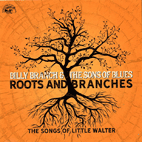 Billy
Branch & The Sons of Blues
Billy
Branch & The Sons of Blues
Roots and Branches - The Songs of Little Walter
Alligator Records 2019
Sonny Boy Williamson I (John Williamson) and Sonny Boy Williamson II (Aleck
Rice [or Ford] Miller) are often cited as pioneers of modern blues harmonica.
However, to many blues aficionados and historians, it is Marion Walter
Jacobs (“Little Walter”) who represents the epitome of mouth
harp innovation and excellence. A Louisiana native, Jacobs spent most
of his career in Chicago. He was the first harmonica player in Muddy Waters’
band, and continued recording with Muddy even after leaving the band.
His recordings with his own bands and with innumerable legends established
his legacy. Tragically, at his death in 1968 he was only 37 years old.
This new release by the venerable Alligator label isn’t the first
Little Walter tribute album. Among others that have been released are
efforts by harp mavens George “Harmonica” Smith, Mark Hummel,
and (a name new to me) Mo Al Jaz and Friends. Here is another that deserves
plaudits.
Billy Branch, of course, is a lauded Chicago harmonicat with a resume
of decades of quality touring and recording. Here he pays homage to Walter
with the backing of his own band, the skilled Sons of Blues, whose current
lineup sports Giles Corey on guitar, Sumito Ariyoshi on piano, Andrew
Thomas on drums, and Marvin Little on bass. They dig into fourteen Walter
songs, filling nearly a full hour with mainly familiar but also a few
more obscure tunes. The set even concludes with a touching bonus: a verbal
reminiscence of Jacobs by his daughter, Marion Diaz.
Not only was Little Walter a major influence on a myriad of other blues
musicians he was also highly popular during the 1950s and 1960s. Remarkably,
more than a dozen of his songs made it into the top ten on Billboard rhythm-and-blues
charts. One of those is the opener of this set, “Nobody But You.”
Branch and company’s treatment of the song has a livelier rhythm
than usually present in Walter’s recorded tracks, and a pithy mid-tune
guitar solo. The welcome message is that this set is truly a tribute to
Walter but not a slavish imitation; there are excursions into gospel,
funk, and even rock territory. Branch’s harmonica playing is top-notch,
as it is throughout.
“Juke,” probably Little Walter’s most famous song, also
appears on the album; with research I learned that it is the only harmonica
instrumental that has ever been a number one hit on the Billboard R&B
chart. Branch’s version sounds quite different than Walter’s
recorded renditions, with piano more prominent. Other Little Walter standards
covered include “Mellow Down Easy,” “My Babe,”
“You’re So Fine,” “Blues with a Feeling,”
and the album’s longest track, “Last Night.” On the
latter Branch delivers some of his finest harp blowing, and some smooth
and soulful vocalizing…which provides occasion to remark on its
contrast to Little Walter’s own singing. To my mind, Walter was
a fine and underrated vocalist whose singing had more than a hint of a
Southern drawl and frequently an appealing and intriguing undercurrent
of something sneaky or suggestive.
“Roots and Branches” is a worthy encomium to a blues pioneer
and legend, to be enjoyed for itself and as a stimulus to go back and
listen to the masterful Little Walter himself.—Steve Daniels
 Kenny
Parker
Kenny
Parker
Hellfire
Rock-a-while
Kenny Parker is a longtime Detroit area blues guitarist who played with
Detroit’s beloved Butler Twins in the mid to late ‘90s. He
played on their 1996 release Pursue Your Dreams and 2000’s The Butler’s
Boogie, producing the former. While touring Europe with the Butlers he
was discovered by the London-based label JSP, which put out his debut
album, Raise the Dead, in 1996. On Hellfire, Parker is joined by the Kenny
Parker Band, with Dan Devins on lead vocals and harmonica, Mike Marshall
on bass and Dave Marcaccio on drums. Guitar legend Jim McCarty (Mitch
Ryder & the Detroit Wheels, Cactus, the Rockets) plays on eight of
the twelve tracks. The band is augmented throughout on piano and organ
by ace keys men Bill Heid, Chris Codish and Leonard Moon. Hellfire contains
11 Kenny Parker originals and one cover - the Omar and the Howlers’
“Hard Times In The Land Of Plenty” which was recorded live.
“I’ve Got My Eye On You” starts the album off with Devins
playing a concise harp solo following the 1st verse. McCarty plays around
the 2nd verse and then follows Parker’s solo ending his turn with
his distinct vibrato. Later both guitarists trade licks, Parker’s
Fender vs. McCarty’s Gibson. Not to be outdone, Bill Heid wraps
things up with a tasty piano solo through the fade. The Muddy Waters-influenced
“Blind and Paralyzed” is a stomper featuring the harmonica
of Brian Miller that sounds as if it was recorded at 2120 S. Michigan
Avenue. “Bye Bye Baby” is a straight ahead rock and roller
reminiscent of McCarty’s Rockets, who contributes slide guitar to
the track. The title track “Hellfire” is a swampy rocker which
contains some nice solos by both Parker and McCarty with some B3 organ
padding underneath. “I’m Missing You” is a slow Stonesy
number with a nice tremolo picking guitar part by Parker. A highlight
of the album is “Back Up Plan,” a slow blues with some heartfelt
vocals by Devins, again featuring some fine guitar work by Parker and
McCarty.
The album has a nice balance of grooves and tempos but never strays far
from the electric blues that came out of Chicago back in the day. Kenny
Parker’s guitar playing is tasty and timeless, the songs are real
solid and sounds like they could have been written 50 years ago, with
no modern references anywhere. Dan Devins is a revelation, showing great
range and blowing fine harp throughout. The rhythm section of Mike Marshall
and Marcaccio is a rock and Jim McCarty is Jim McCarty. Well done, gentlemen!
– Bob Monteleone
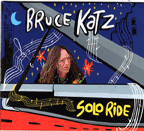 Bruce
Katz
Bruce
Katz
Solo Ride
American Showplace Music 2019
Bruce Katz certainly has impeccable credentials. As is typical of many
instrumental experts in popular music genres, he was first a classical
player, but hearing a Bessie Smith record when he was ten years old led
him to the blues…followed not long after by exposure to boogie woogie,
swing, and jazz. He has been both a student and a teacher at the renowned
Berklee College of Music in Boston. The litany of performers that he has
played and recorded with is mind-boggling. His resume includes stints
in the bands of Delbert McClinton, Ronnie Earl, John Hammond, and Gregg
Allman. For three decades he has led his own band and has appeared on
innumerable records and received accolades aplenty.
The man has nothing to prove, but nonetheless here he is, fingers dancing
on the keys as he demonstrates his artistry on a dozen original tracks
ranging across genres, tempos, and moods. The release is a follow-up to
his acclaimed 2018 album band album, “Get Your Groove!” On
this outing, however, Katz (also an adept organist) proceeds alone on
the piano…although that he is playing solo at times is difficult
to believe, as his steady left hand provides its own constant rhythm section.
The set commences with the rollicking “Down at the Barrelhouse,”
succeeded by “Crescent Crawl,” a five-minute-plus display
of virtuosity varying from languid to lilting. Equally pleasing is “It
Hurts Me Too,” a song which the liner notes credit to Katz but which
is recognizably an interpretation of the blues classic penned by slide
guitar great Elmore James and covered by Eric Clapton among others. Ready
for something different? “Praise House” flirts with atonality
and dissonance and takes full advantage of the low register of the 88s.
Right after, we’re treated to “Red Sneakers,” redolent
of a 1920s speakeasy performance, and then a sublimely pensive “Dreams
of Yesterday.”
The second half of the set wends its way through a similar eclectic sestet
of tracks, two of which, the shortest two numbers, ramp up the energy:
“Going Places” is a zesty invitation to get up and dance,
and “Watermelon Thump” could indeed be described as a thumping
shuffle. The set closes with “Redemption,” another lyrical
beauty. Let’s consider the last song title to be ironic, because
Katz’s latest album needs no redemption. It’s not strictly
a blues album; there is a jazz sensibility, there are snippets of classical
music, and the absence of singing to some may be a minus. It can be a
challenge for an all-instrumental album to maintain interest, but in my
opinion Katz has easily met that challenge and more.—Steve Daniels
 Ian
& Sylvia
Ian
& Sylvia
The Lost Tapes
Stony Plain 2CD
During the 1960’s and 1970’s the Canadian folk-singing duo
Ian and Sylvia were trailblazers for the singer-songwriter movement. As
liners author Larry LeBlanc puts it: “While Ian & Sylvia’s
catalog is filled to the brim with stellar music, The Lost Tapes, culled
from newly-discovered concert tapes from the early ‘70s, cement
their reputations as performers who pushed the boundaries of folk, blues,
country, rhythm and blues, and rock ‘n’ roll in that period.”
He continues: “Their pivotal role in music history may be their
refusal to be trapped in the patterns of their past as one of the leading
acts of the ‘60s folk era and along with the Byrds, Gram Parsons,
Bob Dylan, Linda Ronstadt, Waylon Jennings and Willie Nelson, laying the
foundation of Americana music that evolved as a recognized source of popular
culture.” The real treat here is that these are not studio performances
with much of their most familiar repertoire masterfully presented on the
first disc, including “Four Strong Winds,” “Summer Wages,”
“Four Rode By,” “Darcy Farrow,” “When First
Unto This Country” and “Little Beggar Man” among others.
The second disc accents their avowed versatility, with highlights including
a rootsy version of Robert Johnson’s classic “Come On In My
Kitchen,” a soulful redo of Mel and Tim’s “Starting
All Over Again,” a rocking rendition of Ricky Nelson’s “How
Long” and a pair of Buck Owens-authored numbers—“Crying
Time” and “Together Again.” A fitting celebration of
the pair’s recent induction into the Canadian Songwriters Hall of
Fame. Well worth tracking down!—Gary von Tersch
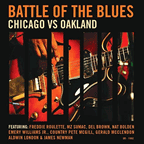 Various
Artists
Various
Artists
Battle Of The Blues: Chicago VS Oakland
Delta Roots CD
This imaginative, 13 track, “concept” deck recalls those
vintage King LPs of the ‘50s where the likes of Roy Brown and Wynonie
Harris battled it out with boxing gloves on the covers. Only, this time
around, the focus is on cities—with the greater Bay Area represented
by the likes of not only Pittsburgh, California’s dynamic vocalist,
MZ. Sumac (the daughter of legendary bluesman Craig Horton) lamenting
life with her “Broke Ass Man” along with 91 year-old club
favorite Nat Bolden (former owner of Oakland’s ‘Til Two blues
club) with his downbeat original “Good Morning Mr. Blues”
and resilient lap steel guitarist Freddie Roulette, who shines on a couple
of producer Twist Turner instrumental originals—“Take It Easy”
and “Red Tide.” Other Bay Area associated artists here are
Oakland born and raised Aldwin London (who, for some reason, performs
Willie Nelson’s “Funny How Time Slips Away”) and the
late Country Pete McGill, who pays tribute to his bumping and grinding
“Hoochie Coochie Mama.” The Windy City checks in with a quartet
of equally talented musicians with the late vocalist Emery Williams Jr
(an in-demand rhythm guitarist for a host of Chicago’s finest over
the years) represented by two tracks (a passionate “Hurtin’
On You” and the gospel blues “Mama Don’t You Weep”),
along with West Side resident James Newman (former bass player in Magic
Sam’s band) who takes the lead vocals on both the R&B-flavored
“Hit And Run Lover” and the testimonial “Me And My Guitar.”
Tracks by “Mr. Excitement” Del Brown and Gerald McClendon
also impress with Brown’s formidably thrusting tenor to the fore
on the deep soul blueser “Now That I’ve Gone” and the
reflective “Time Slippin’ Away” while McClendon, who
is known as the “Soul Keeper” in Chicago, proffers a smoldering
rendition of Turner’s “Cold In The Street.” Hats off
to Twist Turner, who not only wrote most of the songs but played drums
throughout and, in spite of various health issues, persisted in his vision
of offering a career boost to this more than able roster of criminally
under-appreciated blues musicians.—Gary von Tersch
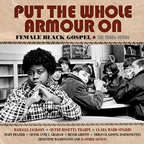
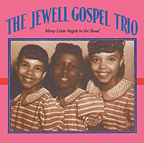 Various Artists
Various Artists
Put The Whole Armour On:
Female Black Gospel—The 1940s-1950s
Narro-Way 2CD
The Jewell Gospel Trio
Many Little Angels In The Band
Gospel Friend CD
My Swedish friend and perceptive record producer, Per “Slim”
Notini, has really outdone himself with this great-sounding new pair of
vintage black gospel recordings. The 2 CD extravaganza, Whole Armour,
whose stark, racial strife-illustrative 1951 cover shot sadly still resonates,
collects 54 dynamic sides that cover all the bases while the 19 track
Jewel Gospel Trio disc, featuring a very youthful Candi Staton, was “one
of the first traveling gospel outfits daring enough to break the stricture
by adding blues-based rhythms to their sound,” as liners author
Opal Louis Nations sagely asserts. A few favorites from Whole Armour include
“When The Pearly Gates Unfold” by Cynthia Coleman & The
Colemanaires (Coleman later had success as an R&B thrush and is perhaps
best known for introducing Muddy Waters to “Got My Mojo Working”
when they were touring together) along with a couple of tracks (“Jesus
Remembers” and “I’m Going Home) from the Clara Ward
Singers, who were probably the most emulated and popular female gospel
group at the time and I must mention the scorching “Jesus Is A Rock
In A Weary Land” by Dorothy Love Coates and the Gospel Harmonettes—who
later had an extended tenure with Specialty Records—just to cite
three. Further titles feature the likes of the regal Mahalia Jackson,
guitar-playing Sister Rosetta Tharpe, Tharpe’s one-time foil Marie
Knight, bluesy Bessie Griffin and the marvelous Ernestine Washington,
who “should have shared Mahalia’s fame, but the mass media
only had space for one African-American gospel genius,” to quote
liners scribe Chris Smith. There’s a lot to explore on this salutary
compilation. As well as with the latter release, that showcases “three
tot-sized female juveniles with voices as loud and mature as the Ward
Singers,” as Nations comments. During the 1950s, they toured the
traditional gospel circuit with the Soul Stirrers, Rev. C.L. Franklin
and Mahalia Jackson and recorded several sides for Apollo, Savoy and Nashboro.
Picks begin with a pair of exhilarating numbers (“At The Cross”
and “Rest, Rest, Rest”) where they are accompanied by Deacon
Jones on guitar and Lorenzo Holden on lap-steel, an impassioned recasting
of Thomas A. Dorsey’s classic “Take My Hand Precious Lord,”
a bluesy “I Looked Down The Line And I Wondered” and a resolute
reflection, composed by Trio member Shirley Ann Lee, called “Can’t
Give Up” from 1968. Pick ‘em both up (easily on Amazon) and
spend a Sunday afternoon you won’t forget for a while.—Gary
von Tersch
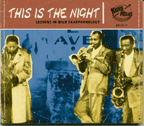
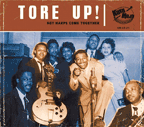
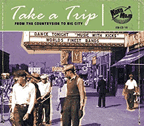
VARIOUS ARTISTS
This Is The Night/Lessons In Wild Saxophonology
Koko Mojo CD
Tore UP!/Hot Harps Come Together
Koko Mojo CD
Take A Trip/From The Countryside To The Big City
Koko Mojo CDThree more top-notch compilations from Germany’s prolific
Koko Mojo imprint, curated by Little Victor aka DJ “Mojo Man. This
Is The Night shines the spotlight on the mighty tenor saxophone with 28
tracks from the well-known to the nigh to unknown. Among the former are
the likes of Excello’s Charles Sheffield (with his easy rocking
“It’s Your Voodoo Working”), Duke’s hit-maker
Roscoe Gordon fronting Joe Scott’s orchestra on “Tummer Tee,”
Fire‘s Mary Ann Fisher with the jumping “Wild As You Can Be,”
Baton’s Noble “Thin Man” Watts with the enervating instrumental
foray “Hot Tamales” (“and cha-cha”) while Little
Papa Joe cloaks the identity of the late Jody Williams, who’s accompanied
by veteran sax maven Harold Ashby with Willie Dixon on bass on the expressive
blues “Looking For My Baby.” Also noted are a covey of great
instrumental/dance workouts—picks include the African-American Rivieras
with a frantic “Knock On Wood” (not the well-known “Knock
On Wood”), Jimmie Toliver’s dancer “Hoochie Kootchie
Koo,” the Passengers’ squallingly romping “Sand In Your
Eyes” and a fiery slab of compellingly electric, soulfully compelling
fury titled “Part Time” by one Hank Moore (and a great guitarist)
on Whip Records. And that’s only the tip of the iceberg! The “travel”
themed Take A Trip ( “Going Back To Kansas City,” “Goodbye
New York, Hello New Orleans,” “Take A Trip,” “I’m
Traveling”) along with various mention of favored destinations (already
mentioned as well as “San Antonio,” “Quaker City,”
“Louisville, Kentucky” and, surprisingly, “East L.A.”)
moves along nicely as the 28 well-chosen, clunker-free tracks, feature
not only the likes of Johnny Guitar Watson, Percy Mayfield, Big Walter,
Sonny Boy Williamson (an old Trumpet side), Bill Doggett, Roy Brown, Joe
Liggins and Andre Williams but more obscure artists like the Pacers (with
their outrageous novelty “Short Squashed Texan,” Mr. Bo’s
declarative “I’m Leaving This Town,” Fletcher Smith’s
bouncy “Brand New Neighborhood,” the team of Louis & Frosty
on the finger-picking rife instrumental “Train Time” and one
Bobby Long is headed for “Jersey City.” Elmon Mickle aka Drifting
Slim is the only artist accorded two cuts (“Lonesome Highway”
c/w “Jackson Blues”), with guitarist Phillip Walker in tow.
Another top-notch collection courtesy of Little Victor.
Tore Up! is just that, 28 of the Mojo Man’s “fave harp tunes”
that also functions as an alert anthology of sorts. Opening with Hot Shot
Love’s wonderful Sun 78 “Harmonica Jam” and Model T-Slim’s
raunchy “Shake Your Boogie” and closing with the great J.B.
Lenoir and Junior Wells’ dynamic workout “Back Door”
and Eddie Kirkland’s entertaining “Train Done Gone”
with room between for the likes of “Look On Yonder Wall” by
a slide-less Elmore James (with Sam Myers on harp); a hootin’ and
hollerin’ “Call The Doctor” by the indefatigable Doctor
Ross; an alluring swamp blues, “Have It Your Way,” by Excello’s
legendary Lightnin’ Slim (“blow your harmonica son!”)
and Polka Dot Slim with his unique mosquito-blues “A Thing You Gotta
Face” along the way. Other particular favorites would begin with
Buster Brown’s moody “Madison Shuffle,” Rockin’
Sidney’s “You Ain’t Nothing But Fine,” Mo-Jo
Buford’s appreciative “Whole Lotta Woman,” Lazy Lester’s
“Sugar Coated Love,” Silas Hogan’s pointed “I’m
Gonna Quit You Pretty Baby “ and Sunny Blair’s imploring “Please
Send My Baby Back,” that features Ike Turner’s piano and Baby
Face Leroy’s guitar—‘One of the greatest postwar sides,’
my buddy UK Phil avers. Can’t go wrong with any of these and the
vintage packaging is a welcome plus.—Gary von Tersch
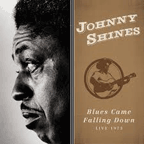 Johnny
Shines
Johnny
Shines
The Blues Came Falling Down—Live 1973
Omnivore CD
Not many 20th century musicians could boast of a career that included
rambling with Robert Johnson, playing with blues legends like Little Walter,
Willie Dixon, Mississippi Fred McDowell and Robert Lockwood Jr. among
others while recording for Columbia, J.O.B. and Chess Records. Disappointed
with the music business, singer/guitarist Shines packed it in in the mid-fifties
only to be “rediscovered” in the blues boom of the mid-sixties
after appearing on a well-received Vanguard album (that was released unlike
most of his earlier recordings) as well as touring and recording until
a stroke slowed him down somewhat in 1980. This previously unissued, mostly
solo “live in St. Louis” recording dates from 1973 and finds
Shines at the peak of his powers before an appreciative college audience
at Washington University’s Graham Chapel in St Louis—among
the twenty numbers are, naturally, four brilliant Robert Johnson covers
(“Kind Hearted Woman Blues,” “I’m A Steady Rollin’
Man,” the stomping “They’re Red Hot (Hot Tamales”)
and “Sweet Home Chicago”), a passionate reworking of the gospel
chestnut “Stand By Me,” a plaintive redo of Sleepy John Estes’
“Someday Baby Blues” and one of “his mother’s
favorite songs”—Willie Johnson’s confessional “It’s
Nobody’s Fault But Mine.” The remainder are Shines originals
and while his classic “Dynaflow Blues” isn’t here there
are plenty of other gems, including the opening “Big Boy Boogie,”
a contemplative “Cold In Hand Blues,” the downbeat “Stay
High All Day Long,” the atmospheric title song and the slide guitar-embossed
“Tell Me Mama.” Other notable tracks include a powerful “Seems
Like A Million Years” and the vibrant set-closing query “How
You Want Your Rolling Done.” Shines would go on to go in the studio
for the likes of Testament, Rounder, Blind Pig and Biograph among other
labels, and tour internationally. He also appeared in the documentary
The Search For Robert Johnson in 1991, just before his death in 1992.
The Blues Hall Of Fame wasted no time inducting him the same year. Long
live Johnny Shines!—Gary von Tersch
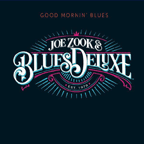 Joe
Zook & Blues Deluxe
Joe
Zook & Blues Deluxe
Good Mornin’ Blues
www.joezookblues.com
Guitarist /singer Joe Zuccarello has been entertaining East Coast blues
audiences for decades. The Trenton, New Jersey musician was inducted into
the Blues Hall of Fame in 2013. Good Mornin’ Blues is the latest
from Joe Zook & Blues Deluxe. The ten tracks on the albums include
eight Zook originals with styles range from rockin’ blues, straight
ahead Chicago blues and jump blues with some jazz influences as well.
The recording kicks off with a barrage of unaccompanied screaming riffs
leading into the title track, a basic 12 bar with some jazz-informed piano
work by James Cheadle culminating with an upper register slide solo by
Zook. A three-piece horn section appears on seven of the songs, starting
with “I Love My Baby’ which has a nice tenor sax solo followed
by a Jimmy Smith-inspired solo on the Hammond B3 organ by John Sopko.
The horn arrangements are tasty throughout and lend some great padding
to the tracks. The Louis Jordan cover, “Caldonia,” is a highlight
with solos by Angel DiBraccio on alto, Steve Kaplan on baritone sax, Danny
Tobias on trumpet, and not to be outdone, Tony Buford on harmonica. The
band is really swinging now, great job by drummer Jeff Snelson and bassist
Bill Holt, who sings this jump blues classic. The rocking “It Ain’t
What You Do” has some more great piano work by Cheadle and Zook
shines again with his very melodic and pinpoint slide playing. On “On
My Mind,” the lyric strays from the usual blues concerns and mentions
some foreign policy issues the USA has to deal with. On the standard “Same
Old Blues,” DiBraccio shines again on the alto. The closer, “I
Got Nothing To Say,” starts with some clean minor chord strumming
by Zook and features an electric piano solo by James Cheadle that gives
the track a 70’s fusion feel. As always, the horn chart is unobtrusive
but effective.
The musicians seem to have a lot of familiarity with each other and the
playing is always confident and well-schooled, for lack of a better word.
Let’s hope to hear more from Joe Zook & Blues Deluxe in the
near future! – Bob Monteleone
Home
/ Blues Blogs /
Artist Links / Blues
Links / Videos / Store
Subscribe / Advertise
/ Back Issues
/ Contact / Staff